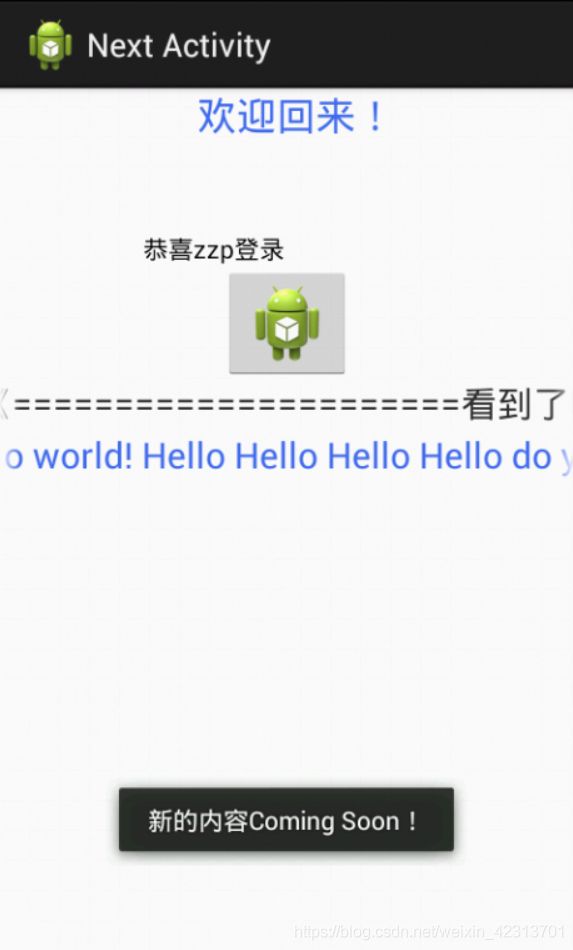- mac 备份android 手机通讯录导入iphone,iphone如何导出通讯录(轻松教你iPhone备份通讯录的方法)...
weixin_39762838
mac备份android手机通讯录导入iphone
在日新月异的手机更替中,换手机已经成为一个非常稀松平常的事情,但将旧手机上面的通讯录导入到新手机还是让不少小伙伴为难,本篇将给大家详细讲解这方面的知识:“苹果手机通讯录怎么导入到新手机”及“安卓手机通讯录导入到新手机”的方法。一、苹果手机通讯录导入到新手机常用方法(SIM卡导入)在苹果手机主频幕上找到“设置”,单击进入设置菜单,下拉菜单列表,点击“邮件、通讯录、日历”,然后找到“导入SIM卡通讯录
- HBuilderX真机运行安卓APP
hello_world_Q
android
前提:1.安卓设备进入开发者模式(设置-系统-关于本机-点击版本号直至出现已进入开发者模式提醒)2.找到开发者选项-打开USB调试3.下图4.下图
- 安卓玩机搞机技巧综合资源----安卓机型使用ADB指令 无需root 卸载 禁用当前机型各种软件app
安卓机器
安卓玩机搞机技巧综合资源android
在前面的博文我有分享过如何使用adb来卸载禁用有些系统自带的软件。今天将详细的步骤来讲解。在操作前需要注意。不要禁用或者卸载有些系统应用如应用商店和系统更新等。否则系统严重会导致不开机。在做未有把握操作之前,最好先备份数据。如果遇到卡logo问题,极端情况下可能要在Recovery界面清除数据才能启动系统或者线刷来救砖。前期工作1----下载adb环境工具{https://dl.google.co
- ⭐Unity 安卓环境中正确地读取和处理 XML 文件
惊鸿醉
Unityunityandroidxml
写了一个选择题Demo,电脑包和编辑器内无问题,但是打包安卓手机之后题目无法正常使用,想到的是安卓环境中正确地读取文件的问题改进方案:1.由于XmlDocument.Load方法在Android上的路径问题(由于文件位于APK内部,无法像在文件系统中那样直接访问),需要先使用UnityWebRequest来异步加载文件内容,然后再解析XML。2.异步处理:修改你的代码,以支持异步文件加载和处理,这
- Unity 热更 之 【HybirdCLR】+【YooAsset】 [安卓 Android端] [代码 + 资源热更] 功能的 简单实现演示
仙魁XAN
Unity进阶unityHybirdCLRYooAssetHotUpdate热更新
Unity热更之【HybirdCLR】+【YooAsset】[安卓Android端][代码+资源热更]功能的简单实现演示目录Unity热更之【HybirdCLR】+【YooAsset】[安卓Android端][代码+资源热更]功能的简单实现演示一、简单介绍二、HybridCLR三、YooAsset四、HybirdCLR引入工程五、YooAsset引入工程六、Python服务器简单构建七、Hybir
- 简化安卓操作:利用ADB命令返回主页、首页等操作
开心呆哥
androidadb
介绍:在日常使用安卓设备时,经常需要返回到主页或者首页。虽然通过手动点击设备上的按钮可以轻松实现,但对于一些需要频繁进行此操作的场景,这种方式可能显得有些繁琐。幸运的是,利用ADB(AndroidDebugBridge)命令,我们可以在不触摸设备的情况下轻松地返回到主页、首页等操作,从而提高操作效率。本文将介绍如何利用ADB命令来实现这些操作,让您的安卓设备操作更加便捷。正文:1.返回主页:要通过
- 安卓手机怎么安装国外应用
印随2018
怎么解决国内无法使用GooglePlay商店我一直使用的是安卓手机,但是想安装国外应用的话,非常麻烦。今天发现一种最简单的方式,无比高兴,啊哈哈打开https://www.apkmonk.com/,类似于安卓应用商店,好在可以直接下载apk文件想办法发送到手机上在手机上点击安装
- 基于nodejs+vue的美妆彩妆网站的设计与实现(源码+LW+调试文档+讲解等)
程序员gelei
nodejs毕业设计项目vue.js前端javascript
目录:博主介绍:完整视频演示:系统技术介绍:后端Java介绍前端框架Vue介绍具体功能截图:部分代码参考:Mysql表设计参考:项目测试:项目论文:为什么选择我:源码获取:博主介绍:博主:程序员gelei:全网拥有20W+粉丝、CSDN作者、博客专家、全栈领域优质创作者、平台优质Java创作者、专注于Java、小程序、python、安卓技术领域和毕业项目实战✌Java精品实战案例《1000套》20
- 2K价位的手机还有这些神仙功能,绿厂ColorOS系统yyds
机测女孩
有一个有趣的现象,即使到了2021年,苹果手机在硬件技术上已经被安卓阵营大幅领先,但依然有大批的粉丝为了体验iOS趋之若鹜,可见用户对于手机系统的看重并不亚于参数配置。近年来,不少国产品牌的手机明显意识到了这一点,在堆砌参数的同时也非常重视系统的构建与优化,诸如华为、OPPO等手机品牌在整体系统体验大幅上升。就拿我手上的2k价位的OPPOA96来说,作为一款价格相当亲民的中端机型,其系统体验上却完
- 安卓将本地日志上传到服务器
胡子洲
Androidandroid服务器
在安卓开发中,将本地日志上传到服务器是一个常见的需求,特别是在开发需要远程监控或调试的应用时。以下是一个基本的步骤和示例,说明如何实现这一功能:1本地日志上传到服务器1.1准备服务器首先,你需要在服务器上设置一个接口,用于接收上传的日志文件。这个接口可以是RESTfulAPI,使用HTTPPOST方法接收文件。你可以使用各种后端技术栈来实现这个接口,如Node.js、Python(Flask或Dj
- 计算机毕业设计选题推荐-基于Python框架项目推荐(中)
计算机毕设大佬
Java毕设实战项目Python毕设实战项目爬虫+大数据毕设实战项目python计算机毕业设计django计算机毕业设计如何选题25届计算机毕业设计如何选题计算机毕业设计选题推荐24届计算机毕设选题推荐
博主介绍:✌十余年IT大项目实战经验、在某机构培训学员上千名、专注于本行业领域✌技术范围:Java实战项目、Python实战项目、微信小程序/安卓实战项目、爬虫+大数据实战项目、Nodejs实战项目、PHP实战项目、.NET实战项目、Golang实战项目。主要内容:系统功能设计、开题报告、任务书、系统功能实现、功能代码讲解、答辩PPT、文档编写、文档修改、文档降重、一对一辅导答辩。获取源码可以联系
- Gemini实时语音模式对安卓用户免费——现在你就可以试用
AI小智慧
语音识别人工智能
Gemini,这是谷歌快速崛起的AI驱动应用,现在已经开始向Android用户免费推出其实时语音模式。这将使用户能够与Gemini进行实时的交互式语音对话,这是我们与AI互动方式的一大进步。之前,用户只能通过传统的文字输入和响应来与Gemini互动,而现在借助Gemini实时语音模式,用户可以免提地实时探索想法、头脑风暴和讨论各种话题。这种创新互动体验与光年AI的灵活工作流不谋而合,进一步增强了用
- 新版本flutter混编安卓没有flutter类
絮语时光
flutterflutterandroid
Flutter升级到1.12后遇到的问题添加链接描述前些日子评论区里wangwhatlh同学反馈遇到了程序包io.flutter.facade不存在问题,起初我运行了一下之前的项目,发现可以正常运行,加上我自己有一段时间没有用过Flutter了,也就没太重视这个问题。说来也是惭愧,最近又陆续有多位小伙伴反馈了这个问题,我才终于意识到这是一个普遍性问题,简单查了一下了解到这个错误是Flutter1.
- 安卓实现微信聊天气泡
温正实
android微信
一搜没一个能用的,我来:布局文件:-->左边气泡drawable文件:右边气泡drawable文件:
- Unity 插件 UniWebView,可以内嵌网页/浏览器到应用中
Jinx Boy
unity游戏引擎android
给大家推荐一个非常好用的unity内嵌网页插件:UniWebView最近在做安卓pad应用开发,需要用到内嵌网页的功能,发现这个最好用。一拖一改就可以了就是遇到了两个问题:一个是没有定位权限有些网页会打不开,解决方案可以看这篇:UnityAndroid内嵌网页,网页不开,没有定位权限另一个是加密的网页内容不允许加载,解决方案可以看这篇:Android开发,嵌入网页,网页打不开报错ERR_CLEAR
- 零基础安卓开发起步(二)
zhyuzh3d
本文介绍从零开始进行安卓APP的开发,MaterialDesign的使用。记录学习过程,仅供新手参考。引入MaterialDesignMaterialDesign是谷歌发布的一套安卓界面元素模板。首先我们把它引入到项目里面。首先从项目列表中打开【GradleScripts-Build.gradle(module:app)】文件。如果没有这个文件,不要着急,注意AndroidStudio底部的文字,
- 直返APP省钱靠谱吗 亲身经历告诉你答案
氧惠好项目
直返APP可以在各大应用商店或官方网站下载。例如,在苹果应用商店、安卓应用商店、微信小程序等平台上都可以搜索到直返APP。氧惠APP(带货领导者)——是与以往完全不同的抖客+淘客app!2023全新模式,我的直推也会放到你下面。主打:带货高补贴,深受各位带货团队长喜爱(每天出单带货几十万单)。注册即可享受高补贴+0撸+捡漏等带货新体验。送万元推广大礼包,教你如何1年做到百万团队。对于直返APP的可
- React-native 桥接Android原生开发
一天清晨
在开发RN的漫漫长河中,早晚有那么一天要接触到安卓的原生开发,笔者来介绍一下其中的酸甜苦辣.对于一个不懂android的小白来说,刚开始有点难,不过都是万事开头难.语言是想通的,原理也是大径若一.1.png开发过程中是要集成高德的导航功能,没有找到好的轮子的,只要写原生代码,然后在用JS去调用原生的导航模块.首先注册模块其意义在与将类注册到RN中,才能用JS去调用publicclassAnExam
- Android视频开发进阶-关于视频的那些术语,android软件开发计算器
wa32saa
程序员架构移动开发android
原文出处:jianshu正文说到安卓的视频开发,大多数朋友们都是用着开源的播放器,或者安卓自带的nativemediaplayer,拿来主义居多,我曾经也是。。。最近这半年因为开始着手重构公司的播放器,也开始学习了很多视频音频开发的相关知识,抱着独乐乐不如众乐乐的想法,开始写一些值得分享的东西。这次的连载和之前的RxJava分享一样,会分开不容的章节。第一次我打算分享一下视频开发中常见的一些知识点
- 2020年是做安卓开发人员的绝佳时机,android开发面试自我介绍
m0_66144765
程序员架构移动开发android
你这样做仅仅是准备好一个开发环境去构建安卓App,但是你还得去准备好基础和基本知识来理解安卓开发和大多数教程使用的通用术语你现在也可以在安卓系统上构建基本的App,并且可以开发一些功能。随意使用空白画布,用你的想象力填充它。当你玩完创意后,2020年你的下一个目标是加快游戏进度,推动自己成为一名为数十亿人构建应用的开发者。我们现在去第二层!提升自己-作为一个安卓开发者Level2这个列表将作为你学
- 【安卓面试】
木啊木啊木
android面试职场和发展
百度-APP相关安卓开发数组排序view流程和surfaceViewrecycleViewview绘制流程停止一个线程停止线程的场景输入一个url观察者模式观察者模式的基本流程:安卓内存共享JNISQLkotlin与java混用的问题Linux命令及原理app启动流程小程序原理加密算法对称加密非对称加密安卓持久化存储方式启动模式和场景ANR以及如何避免数组排序八大排序-及复杂度viewView是用
- 【教程】如何使用 MYScrcpy,一行Python代码获取Android设备 屏幕/摄像头 H264/H265 原始视频流
Me2sY
MYScrcpypythonandroid开发语言智能手机扩展屏应用开发开源测试工具
MYScrcpy1.5.8Github/Gitee1.5.8版本新增获取原始视频流(H264/H265)方法,供小伙伴们在需要原生H264/H265串流时使用要求MYScrcpy>1.5.8pipinstall-Umysc安卓设备开启调试模式,安卓版本>5(摄像头需>11)H265需安卓设备支持H265编码步骤MYScrcpy从设计之初,就是想为小伙伴们打造一款好用易上手的工具包,所以使用起来也非
- 【Sceneform-EQR】使用EQ-Renderer实现手势交互
EQ-雪梨蛋花汤
#Sceneform-EQR移动端开发arjava
title:使用EQ-Renderer实现手势交互date:2024-01-31description:EQ-Renderer是基于sceneform(filament)扩展的一个用于安卓端的三维AR渲染器。本文档记录如何创建一个简单的手势交互示例。Sceneform-EQR简介EQ-Renderer是EQ基于sceneform(filament)扩展的一个用于安卓端的三维AR渲染器。主要功能它包
- 2024年Android开发60条技术经验总结,2024年最新面试安卓系统架构
2301_82243733
程序员android面试学习
总结【Android详细知识点思维脑图(技能树)】我个人是做Android开发,已经有十来年了,目前在某创业公司任职CTO兼系统架构师。虽然Android没有前几年火热了,已经过去了会四大组件就能找到高薪职位的时代了。这只能说明Android中级以下的岗位饱和了,现在高级工程师还是比较缺少的,很多高级职位给的薪资真的特别高(钱多也不一定能找到合适的),所以努力让自己成为高级工程师才是最重要的。这里
- 2025毕业设计指南:如何用Hadoop构建超市进货推荐系统?大数据分析助力精准采购
计算机编程指导师
Java实战集Python实战集大数据实战集课程设计hadoop数据分析springbootjava进货python
✍✍计算机编程指导师⭐⭐个人介绍:自己非常喜欢研究技术问题!专业做Java、Python、小程序、安卓、大数据、爬虫、Golang、大屏等实战项目。⛽⛽实战项目:有源码或者技术上的问题欢迎在评论区一起讨论交流!⚡⚡Java实战|SpringBoot/SSMPython实战项目|Django微信小程序/安卓实战项目大数据实战项目⚡⚡文末获取源码文章目录⚡⚡文末获取源码基于hadoop的超市进货推荐系
- 无水印下载TikTok视频的方法分享
exploration-earth
学习
现在做出海电商的都会往tiktok方面发展,TikTok作为全球超火的短视频平台,视频资源很多,你可能会看中一段超赞的TikTok视频,想要保存到手机里,如果能去水印下载更好!给你推荐一个超简单的APP,让你毫不费力地下载tiktokk视频,还能去除水印!三步搞定tiktok视频下载:①打开tiktok,找到喜欢的视频,点复制链接②打开【大神水印】(ios安卓商店都有),点首页的【提取视频/图片】
- 使用 macOS 为安卓刷机
粒子二面角
macOS下的解决方案mac安卓
简介相较于window端各种版本层出不穷的安卓刷机教程,在OSX上刷机的教程不仅资源较少,而且多数都年代久远。本帖整合了最新(2020-2),较简单的macOS刷机教程,希望可以帮助到各位。本帖所有操作都基于最新的macOS10.15.3。macOS端准备工作1.终端配置首先将macOS更新到最新的Catalina(10.15)版本,因为在该版本下才能较为简单的将默认终端设置为zsh,具体操作过程
- 调研App里的WebDAV功能@FE File Explorer 文件管理器(二)
jaminezhong
今天我又淘到一款特容易链接WebDAV的软件:FEFileExplorer我觉得它最大好处是在Mac版电脑、Android、iOS上,一个全功能的文件上管理app。而且还可以在您的iOS、安卓和Mac电脑上使用流媒体方式播放网络共享、NAS里面的视频和音乐。FEFileExplorerPro+穿越派=个人私有云需要穿越派的,在这里下:https://www.huluer.com/usercente
- Android电源管理基础知识整理
轻口味
android
DozeMode模式由于Android的开放特性,加上国内app开发者的觉悟普遍不高的情况下,越来越多的app开始利用安卓的系统特性甚至可以称为漏洞,故意让app退出后仍然占用大量的硬件资源。越来越多的应用会在后台运行时“假死”,即不进入真正的Sleep,而是不断在后台轮询搜集用户行为或者保持某些长链接来保障数据的实时性。而Android系统自身并未出台对应的策略来约束或者限制这类应用行为,当这类
- 程式语言区分
白总Server
htmlpythonjavac++开发语言
程序语言有很多种,每种都有其特定的用途和特点。以下是一些广泛使用的编程语言:1.Python:易于学习,广泛用于数据科学、机器学习、网络开发、自动化等领域。2.Java:广泛应用于企业级应用、安卓开发、大型系统开发等。3.C:一种基础语言,广泛用于系统编程、嵌入式开发、操作系统等领域。4.C++:C语言的扩展,支持面向对象编程,用于游戏开发、高性能应用等。5.JavaScript:主要用于网页前端
- Enum用法
不懂事的小屁孩
enum
以前的时候知道enum,但是真心不怎么用,在实际开发中,经常会用到以下代码:
protected final static String XJ = "XJ";
protected final static String YHK = "YHK";
protected final static String PQ = "PQ";
- 【Spark九十七】RDD API之aggregateByKey
bit1129
spark
1. aggregateByKey的运行机制
/**
* Aggregate the values of each key, using given combine functions and a neutral "zero value".
* This function can return a different result type
- hive创建表是报错: Specified key was too long; max key length is 767 bytes
daizj
hive
今天在hive客户端创建表时报错,具体操作如下
hive> create table test2(id string);
FAILED: Execution Error, return code 1 from org.apache.hadoop.hive.ql.exec.DDLTask. MetaException(message:javax.jdo.JDODataSto
- Map 与 JavaBean之间的转换
周凡杨
java自省转换反射
最近项目里需要一个工具类,它的功能是传入一个Map后可以返回一个JavaBean对象。很喜欢写这样的Java服务,首先我想到的是要通过Java 的反射去实现匿名类的方法调用,这样才可以把Map里的值set 到JavaBean里。其实这里用Java的自省会更方便,下面两个方法就是一个通过反射,一个通过自省来实现本功能。
1:JavaBean类
1 &nb
- java连接ftp下载
g21121
java
有的时候需要用到java连接ftp服务器下载,上传一些操作,下面写了一个小例子。
/** ftp服务器地址 */
private String ftpHost;
/** ftp服务器用户名 */
private String ftpName;
/** ftp服务器密码 */
private String ftpPass;
/** ftp根目录 */
private String f
- web报表工具FineReport使用中遇到的常见报错及解决办法(二)
老A不折腾
finereportweb报表java报表总结
抛砖引玉,希望大家能把自己整理的问题及解决方法晾出来,Mark一下,利人利己。
出现问题先搜一下文档上有没有,再看看度娘有没有,再看看论坛有没有。有报错要看日志。下面简单罗列下常见的问题,大多文档上都有提到的。
1、没有返回数据集:
在存储过程中的操作语句之前加上set nocount on 或者在数据集exec调用存储过程的前面加上这句。当S
- linux 系统cpu 内存等信息查看
墙头上一根草
cpu内存liunx
1 查看CPU
1.1 查看CPU个数
# cat /proc/cpuinfo | grep "physical id" | uniq | wc -l
2
**uniq命令:删除重复行;wc –l命令:统计行数**
1.2 查看CPU核数
# cat /proc/cpuinfo | grep "cpu cores" | u
- Spring中的AOP
aijuans
springAOP
Spring中的AOP
Written by Tony Jiang @ 2012-1-18 (转)何为AOP
AOP,面向切面编程。
在不改动代码的前提下,灵活的在现有代码的执行顺序前后,添加进新规机能。
来一个简单的Sample:
目标类:
[java]
view plain
copy
print
?
package&nb
- placeholder(HTML 5) IE 兼容插件
alxw4616
JavaScriptjquery jQuery插件
placeholder 这个属性被越来越频繁的使用.
但为做HTML 5 特性IE没能实现这东西.
以下的jQuery插件就是用来在IE上实现该属性的.
/**
* [placeholder(HTML 5) IE 实现.IE9以下通过测试.]
* v 1.0 by oTwo 2014年7月31日 11:45:29
*/
$.fn.placeholder = function
- Object类,值域,泛型等总结(适合有基础的人看)
百合不是茶
泛型的继承和通配符变量的值域Object类转换
java的作用域在编程的时候经常会遇到,而我经常会搞不清楚这个
问题,所以在家的这几天回忆一下过去不知道的每个小知识点
变量的值域;
package 基础;
/**
* 作用域的范围
*
* @author Administrator
*
*/
public class zuoyongyu {
public static vo
- JDK1.5 Condition接口
bijian1013
javathreadConditionjava多线程
Condition 将 Object 监视器方法(wait、notify和 notifyAll)分解成截然不同的对象,以便通过将这些对象与任意 Lock 实现组合使用,为每个对象提供多个等待 set (wait-set)。其中,Lock 替代了 synchronized 方法和语句的使用,Condition 替代了 Object 监视器方法的使用。
条件(也称为条件队列或条件变量)为线程提供了一
- 开源中国OSC源创会记录
bijian1013
hadoopsparkMemSQL
一.Strata+Hadoop World(SHW)大会
是全世界最大的大数据大会之一。SHW大会为各种技术提供了深度交流的机会,还会看到最领先的大数据技术、最广泛的应用场景、最有趣的用例教学以及最全面的大数据行业和趋势探讨。
二.Hadoop
&nbs
- 【Java范型七】范型消除
bit1129
java
范型是Java1.5引入的语言特性,它是编译时的一个语法现象,也就是说,对于一个类,不管是范型类还是非范型类,编译得到的字节码是一样的,差别仅在于通过范型这种语法来进行编译时的类型检查,在运行时是没有范型或者类型参数这个说法的。
范型跟反射刚好相反,反射是一种运行时行为,所以编译时不能访问的变量或者方法(比如private),在运行时通过反射是可以访问的,也就是说,可见性也是一种编译时的行为,在
- 【Spark九十四】spark-sql工具的使用
bit1129
spark
spark-sql是Spark bin目录下的一个可执行脚本,它的目的是通过这个脚本执行Hive的命令,即原来通过
hive>输入的指令可以通过spark-sql>输入的指令来完成。
spark-sql可以使用内置的Hive metadata-store,也可以使用已经独立安装的Hive的metadata store
关于Hive build into Spark
- js做的各种倒计时
ronin47
js 倒计时
第一种:精确到秒的javascript倒计时代码
HTML代码:
<form name="form1">
<div align="center" align="middle"
- java-37.有n 个长为m+1 的字符串,如果某个字符串的最后m 个字符与某个字符串的前m 个字符匹配,则两个字符串可以联接
bylijinnan
java
public class MaxCatenate {
/*
* Q.37 有n 个长为m+1 的字符串,如果某个字符串的最后m 个字符与某个字符串的前m 个字符匹配,则两个字符串可以联接,
* 问这n 个字符串最多可以连成一个多长的字符串,如果出现循环,则返回错误。
*/
public static void main(String[] args){
- mongoDB安装
开窍的石头
mongodb安装 基本操作
mongoDB的安装
1:mongoDB下载 https://www.mongodb.org/downloads
2:下载mongoDB下载后解压
- [开源项目]引擎的关键意义
comsci
开源项目
一个系统,最核心的东西就是引擎。。。。。
而要设计和制造出引擎,最关键的是要坚持。。。。。。
现在最先进的引擎技术,也是从莱特兄弟那里出现的,但是中间一直没有断过研发的
- 软件度量的一些方法
cuiyadll
方法
软件度量的一些方法http://cuiyingfeng.blog.51cto.com/43841/6775/在前面我们已介绍了组成软件度量的几个方面。在这里我们将先给出关于这几个方面的一个纲要介绍。在后面我们还会作进一步具体的阐述。当我们不从高层次的概念级来看软件度量及其目标的时候,我们很容易把这些活动看成是不同而且毫不相干的。我们现在希望表明他们是怎样恰如其分地嵌入我们的框架的。也就是我们度量的
- XSD中的targetNameSpace解释
darrenzhu
xmlnamespacexsdtargetnamespace
参考链接:
http://blog.csdn.net/colin1014/article/details/357694
xsd文件中定义了一个targetNameSpace后,其内部定义的元素,属性,类型等都属于该targetNameSpace,其自身或外部xsd文件使用这些元素,属性等都必须从定义的targetNameSpace中找:
例如:以下xsd文件,就出现了该错误,即便是在一
- 什么是RAID0、RAID1、RAID0+1、RAID5,等磁盘阵列模式?
dcj3sjt126com
raid
RAID 1又称为Mirror或Mirroring,它的宗旨是最大限度的保证用户数据的可用性和可修复性。 RAID 1的操作方式是把用户写入硬盘的数据百分之百地自动复制到另外一个硬盘上。由于对存储的数据进行百分之百的备份,在所有RAID级别中,RAID 1提供最高的数据安全保障。同样,由于数据的百分之百备份,备份数据占了总存储空间的一半,因而,Mirror的磁盘空间利用率低,存储成本高。
Mir
- yii2 restful web服务快速入门
dcj3sjt126com
PHPyii2
快速入门
Yii 提供了一整套用来简化实现 RESTful 风格的 Web Service 服务的 API。 特别是,Yii 支持以下关于 RESTful 风格的 API:
支持 Active Record 类的通用API的快速原型
涉及的响应格式(在默认情况下支持 JSON 和 XML)
支持可选输出字段的定制对象序列化
适当的格式的数据采集和验证错误
- MongoDB查询(3)——内嵌文档查询(七)
eksliang
MongoDB查询内嵌文档MongoDB查询内嵌数组
MongoDB查询内嵌文档
转载请出自出处:http://eksliang.iteye.com/blog/2177301 一、概述
有两种方法可以查询内嵌文档:查询整个文档;针对键值对进行查询。这两种方式是不同的,下面我通过例子进行分别说明。
二、查询整个文档
例如:有如下文档
db.emp.insert({
&qu
- android4.4从系统图库无法加载图片的问题
gundumw100
android
典型的使用场景就是要设置一个头像,头像需要从系统图库或者拍照获得,在android4.4之前,我用的代码没问题,但是今天使用android4.4的时候突然发现不灵了。baidu了一圈,终于解决了。
下面是解决方案:
private String[] items = new String[] { "图库","拍照" };
/* 头像名称 */
- 网页特效大全 jQuery等
ini
JavaScriptjquerycsshtml5ini
HTML5和CSS3知识和特效
asp.net ajax jquery实例
分享一个下雪的特效
jQuery倾斜的动画导航菜单
选美大赛示例 你会选谁
jQuery实现HTML5时钟
功能强大的滚动播放插件JQ-Slide
万圣节快乐!!!
向上弹出菜单jQuery插件
htm5视差动画
jquery将列表倒转顺序
推荐一个jQuery分页插件
jquery animate
- swift objc_setAssociatedObject block(version1.2 xcode6.4)
啸笑天
version
import UIKit
class LSObjectWrapper: NSObject {
let value: ((barButton: UIButton?) -> Void)?
init(value: (barButton: UIButton?) -> Void) {
self.value = value
- Aegis 默认的 Xfire 绑定方式,将 XML 映射为 POJO
MagicMa_007
javaPOJOxmlAegisxfire
Aegis 是一个默认的 Xfire 绑定方式,它将 XML 映射为 POJO, 支持代码先行的开发.你开发服 务类与 POJO,它为你生成 XML schema/wsdl
XML 和 注解映射概览
默认情况下,你的 POJO 类被是基于他们的名字与命名空间被序列化。如果
- js get max value in (json) Array
qiaolevip
每天进步一点点学习永无止境max纵观千象
// Max value in Array
var arr = [1,2,3,5,3,2];Math.max.apply(null, arr); // 5
// Max value in Jaon Array
var arr = [{"x":"8/11/2009","y":0.026572007},{"x"
- XMLhttpRequest 请求 XML,JSON ,POJO 数据
Luob.
POJOjsonAjaxxmlXMLhttpREquest
在使用XMlhttpRequest对象发送请求和响应之前,必须首先使用javaScript对象创建一个XMLHttpRquest对象。
var xmlhttp;
function getXMLHttpRequest(){
if(window.ActiveXObject){
xmlhttp:new ActiveXObject("Microsoft.XMLHTTP
- jquery
wuai
jquery
以下防止文档在完全加载之前运行Jquery代码,否则会出现试图隐藏一个不存在的元素、获得未完全加载的图像的大小 等等
$(document).ready(function(){
jquery代码;
});
<script type="text/javascript" src="c:/scripts/jquery-1.4.2.min.js&quo


